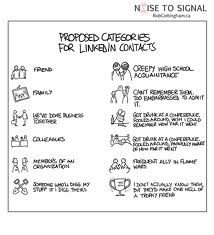 |
| We Take You Beyond the Resume |
Most of us will start our job search online. And most people are still going to the usual places like Monster and Career Builder. We all know today's job market is super competitive. Not only do we all have to compete with each other but many employers hold off hiring perfectly qualified candidates because they're waiting for the elusive, absolutely, beyond perfect candidate. Also known as the "Purple Squirrel". Since most people are heading to common and popular job boards, maybe you should head out where fewer people are looking. Fewer people means less competition and a greater probability that you'll be the one to get the interview. But how do you know where to look? Good thing you came here, because we've got some suggestions for you.
1. Head on over to LinkedIn and check out their job listings. I know, I know, LinkedIn is the most well known place to look for and get connected to jobs. But they give you a little more information that other popular job boards don't. They tell you how many people have already clicked on, and applied for, that job you're looking at. If hundreds of people have already clicked that link, you can figure with that much interest your resume will get lost in the noise no matter how stellar it is. Although, it might not. There's always that tiny chance that yours will stand out. If it does, make sure the rest of your career presentation is outstanding through your LinkedIn profile and a personal website that tells the story of your career.
Another benefit of a job listing at LinkedIn is that frequently the post will include the email address of the hiring manager. Sending your resume directly to this person ensures that it will end up in the hands of an actual person who will take a look at it. Granted, they're only going to take about 20-30 seconds but it's still better than submitting into a system that filters out resumes based on keywords. Most of those resumes never get seen by anyone.
 2. Once you're done mining LinkedIn, head on over to Craigslist. You'll find jobs posted from all over the world across widely varied industries. The best part about these job listings is that for most of them, the resumes are sent directly to a hiring manager. If there's a link that sends you to an automated system your resume ends up being filtered with less chance anyone will see it. But the vast majority of job posts on Craigslist connect you directly with an actual person. There's less competition here because not as many people think to use Craigslist to look for jobs. It's widely assumed that the posts are for small, underfunded businesses that aren't going to pay well. But that's not the case. I've seen posts for openings at large companies like Baxter and Amgen. They may not list the company name, though. But if you want to know before you apply, it can't hurt to respond to the post asking for the name of the company.
2. Once you're done mining LinkedIn, head on over to Craigslist. You'll find jobs posted from all over the world across widely varied industries. The best part about these job listings is that for most of them, the resumes are sent directly to a hiring manager. If there's a link that sends you to an automated system your resume ends up being filtered with less chance anyone will see it. But the vast majority of job posts on Craigslist connect you directly with an actual person. There's less competition here because not as many people think to use Craigslist to look for jobs. It's widely assumed that the posts are for small, underfunded businesses that aren't going to pay well. But that's not the case. I've seen posts for openings at large companies like Baxter and Amgen. They may not list the company name, though. But if you want to know before you apply, it can't hurt to respond to the post asking for the name of the company.

3. Niche job boards focus on openings in a particular industry. They can be harder to find unless you know where to look. And lucky for you, we do. A great place to start looking is any online publication or website that focuses on your industry or field. For example, Mashable has a really good job board that companies pay to post on which means they're probably serious about hiring. The search capability is good and helps you narrow down what you're looking for. Scientific American is another one. If you're looking for a job in any scientific discipline, they've probably got something listed for you. So start looking for websites and companies dedicated to your area of expertise. You may have to scroll to the bottom of the home screen to find what you're looking for. It's not always listed in the main menu. Scientific American is like this. Another benefit is that when you apply from a site like this, it makes you look more like an industry expert yourself. After all, you found the job post while reading articles that keep you current in your area of expertise which demonstrates your interest and dedication to your field.

Finding job openings with less competition from other applicants isn't impossible. With just a little bit of savvy search skills and some effort, you can find a great job without battling hundreds of other competitors. Think of it less as open warfare and hand to hand combat and more like a tactical strike mission. Focus in on the places where you're more likely to be in contact with a person, not a filter. Find smaller job boards run by a publication that specializes in your industry. And don't bother applying to jobs that you know already have hundreds of applicants. You'll probably just get lost in the noise. And that's just not fun for anyone.





























